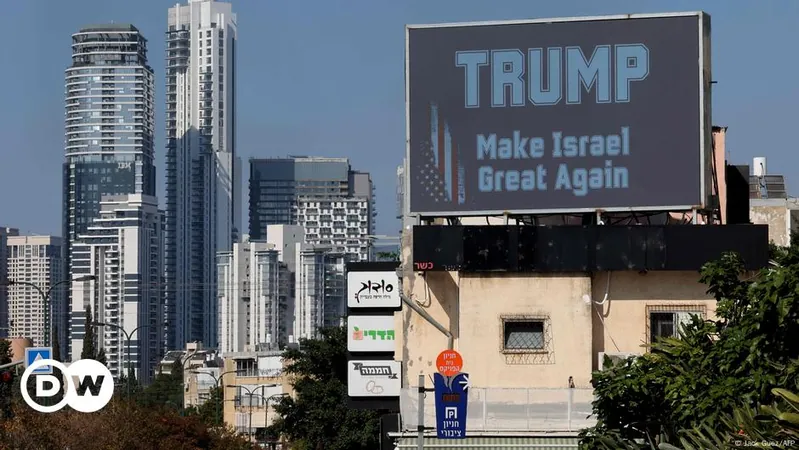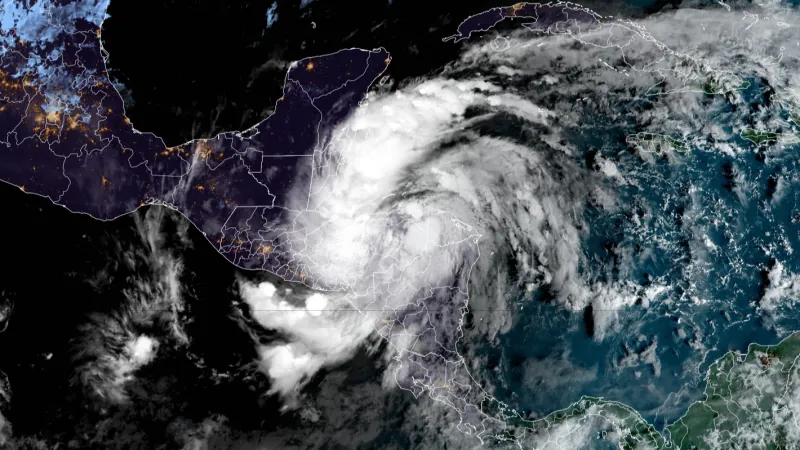
Trump's Reelection: A New Era for Israel and Its Strategic Challenges
2024-11-09
Author: Jessica Wong
Trump's Reelection: A New Era for Israel and Its Strategic Challenges
Israeli Prime Minister Benjamin Netanyahu quickly expressed his enthusiasm for Donald Trump's reelection, labeling it as 'the greatest comeback in history.' Members of his far-right coalition, Bezalel Smotrich and Itamar Ben-Gvir, shared their excitement on social media even before the election results were officially confirmed. Netanyahu was reportedly one of the first leaders to reach out to Trump, with their conversation described as warm and focused on Israeli security and the ongoing Iranian threat.
A post-election poll by Channel 12 revealed that about 67% of Israelis were pleased with Trump's victory, and the atmosphere on the streets seemed to reflect this approval. A Jerusalem resident, Benaya Koller, noted of Trump, 'We hope he will do great things for our country. If he keeps even half of his promises, it would be monumental.'
Yet, not everyone shares this optimism. Critics argue that the current Israeli government, viewed as the most extreme in the nation's history, may have inadvertently hit the jackpot with Trump's return to power. Yehuda Shaul, co-founder of the think tank Ofek, likened Trump's victory to winning an 'American lottery' for far-right leaders in Israel.
Trump's Pro-Israel Policies: What Lies Ahead?
During his first term, Trump implemented several controversial policies that significantly favored Israel. Notably, he recognized Jerusalem as Israel’s capital and moved the US embassy from Tel Aviv, which contradicted decades of international consensus. He also endorsed Israel's claim to the Golan Heights, further solidifying his pro-Israel stance.
Trump's administration was pivotal in the formation of the Abraham Accords, which normalized relations between Israel and several Arab nations but largely sidelined the Palestinian issue. Experts speculate that during his second term, Trump may advocate for deeper ties between Israel and Saudi Arabia and attempt to resurrect his previously proposed 'Deal of the Century.' This plan controversially suggested the annexation of Israeli settlements in the West Bank.
However, the relationship between Trump and Netanyahu has faced strains. Following Trump's 2020 election loss, he showed displeasure when Netanyahu congratulated Biden. After the recent Hamas-led terror attacks of October 2023, Trump publicly criticized Netanyahu's preparedness, hinting at a less-than-cozy dynamic moving forward.
The Israeli-Palestinian Conflict: A Complicated Terrain
The Middle East is at a pivotal junction requiring U.S. leadership, but Trump has yet to articulate a significant strategy for the region. Political observers note that Trump has signaled a desire to finish military operations in Gaza and Lebanon quickly—however, specifics remain scant. Analysts believe Netanyahu might delay decisions, hoping the Trump administration will bolster Israel’s stance on contentious issues such as the Palestinian question.
With Trump in office, critics fear that Israel may receive an unchecked ability to pursue ambitious territorial annexations in the West Bank. These sentiments echo sentiments from the past, with concerns mounting over the fate of Palestinian residents and broader regional stability.
The Settler Movement's Response: A Renewed Thirst for Expansion
Reports of a 'euphoric mood' among Israeli settlers emerged following Trump's reelection. Leaders within this community have coordinated with Republican influencers to set action plans, including initiatives to assert Israeli sovereignty over contested areas and establish new settlements in northern Gaza. Such plans could derail hopes for a two-state solution and hinder prospects for Palestinian statehood.
Amid this uncertainty, Palestinians, like 22-year-old Shadi Assad from Gaza, express despair over their plight. Shadi recounted his displacement multiple times throughout the conflict and voiced skepticism about the prospect of meaningful change in U.S. policy, regardless of who occupies the White House.
As Trump's administration prepares to take shape, both Israelis and Palestinians brace for potential shifts that could redefine the landscape of the Middle East. The stakes are higher than ever, with implications not just for diplomacy but for millions caught in the crossfire of enduring conflict. Will Trump's policies lead to peace, or will they escalate tensions further? Only time will reveal the true impact of this political shift.


 Brasil (PT)
Brasil (PT)
 Canada (EN)
Canada (EN)
 Chile (ES)
Chile (ES)
 España (ES)
España (ES)
 France (FR)
France (FR)
 Hong Kong (EN)
Hong Kong (EN)
 Italia (IT)
Italia (IT)
 日本 (JA)
日本 (JA)
 Magyarország (HU)
Magyarország (HU)
 Norge (NO)
Norge (NO)
 Polska (PL)
Polska (PL)
 Schweiz (DE)
Schweiz (DE)
 Singapore (EN)
Singapore (EN)
 Sverige (SV)
Sverige (SV)
 Suomi (FI)
Suomi (FI)
 Türkiye (TR)
Türkiye (TR)